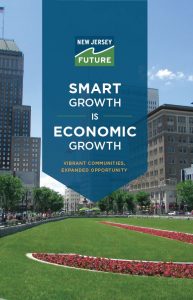Policy Recommendations for Smart Growth
Vibrant communities. Expanded opportunity.
 New Jersey is at a critical stage. A number of our cities and towns are experiencing a promising comeback, with redevelopment and new business activity invigorating once-struggling communities. Yet stubborn, chronic problems remain. High housing costs, crumbling infrastructure and a neglected transit system, and the increasing vulnerability of our coast and towns to climate change, threaten to impede the state’s resurgent competitiveness and diminish residents’ quality of life. Our state and local leaders need to take a comprehensive approach to land use and infrastructure that acknowledges the demographic, economic, and climate forces shaping the way we live now and will live in the future.
New Jersey is at a critical stage. A number of our cities and towns are experiencing a promising comeback, with redevelopment and new business activity invigorating once-struggling communities. Yet stubborn, chronic problems remain. High housing costs, crumbling infrastructure and a neglected transit system, and the increasing vulnerability of our coast and towns to climate change, threaten to impede the state’s resurgent competitiveness and diminish residents’ quality of life. Our state and local leaders need to take a comprehensive approach to land use and infrastructure that acknowledges the demographic, economic, and climate forces shaping the way we live now and will live in the future.
In the following recommendations, New Jersey Future proposes an ambitious but pragmatic plan that will utilize and preserve New Jersey’s most valuable assets to grow diverse and durable economies in communities across the state, and support residents’ efforts to attain economic security.
 1. Invest wisely in infrastructure.
1. Invest wisely in infrastructure.
Make smart, cost-effective investments in transportation and water infrastructure to increase New Jersey’s competitiveness and support healthy communities.
- Refocus state transportation agencies on the mission of improving access to more destinations for more people.
- Fund transit operations and capital improvements adequately in order to restore NJ Transit’s systems and make them long-term growth drivers.
- Pursue a “One Water” strategy to modernize inadequate drinking water, wastewater, and stormwater systems in ways that strengthen communities and support future growth.
 2. Support good local redevelopment.
2. Support good local redevelopment.
Empower cities and towns to take the bold and difficult steps needed to allow them to meet the demographic, economic, and environmental challenges of the next century.
- Provide technical and financial resources to cities and towns to promote compact, walkable development.
- Support transit-oriented development and redevelopment through targeted tax credits and coordinated state policies and investments.
- Adopt a comprehensive housing strategy, including inclusionary zoning practices and incentive programs to ensure individuals and families at all life stages and income levels have access to quality homes.
 3. Incorporate climate risk into decision-making.
3. Incorporate climate risk into decision-making.
Prepare our communities for the consequences of climate change and sea level rise through long-term planning and education about the growing risk of flooding.
- Integrate science-based sea level rise projections and other climate change risk into decision-making at all levels of government.
- Support regional and local approaches to managing increased flood risks through land use changes.
- Expand real estate disclosure requirements to prospective buyers and renters to include details on flood risk.
 4. Coordinate state development efforts.
4. Coordinate state development efforts.
Provide leadership from the governor’s office to direct state investments and incentives to ensure a prosperous, sustainable state and to support communities’ efforts to create great places to live, work and play.
- Implement an organized and strategic state planning process that guides state actions and aligns local and state efforts.
- Initiate better data collection and dissemination, and utilize performance measurement and open reporting of results.
- Leverage new financing possibilities such as a state bank and public-private partnerships.











